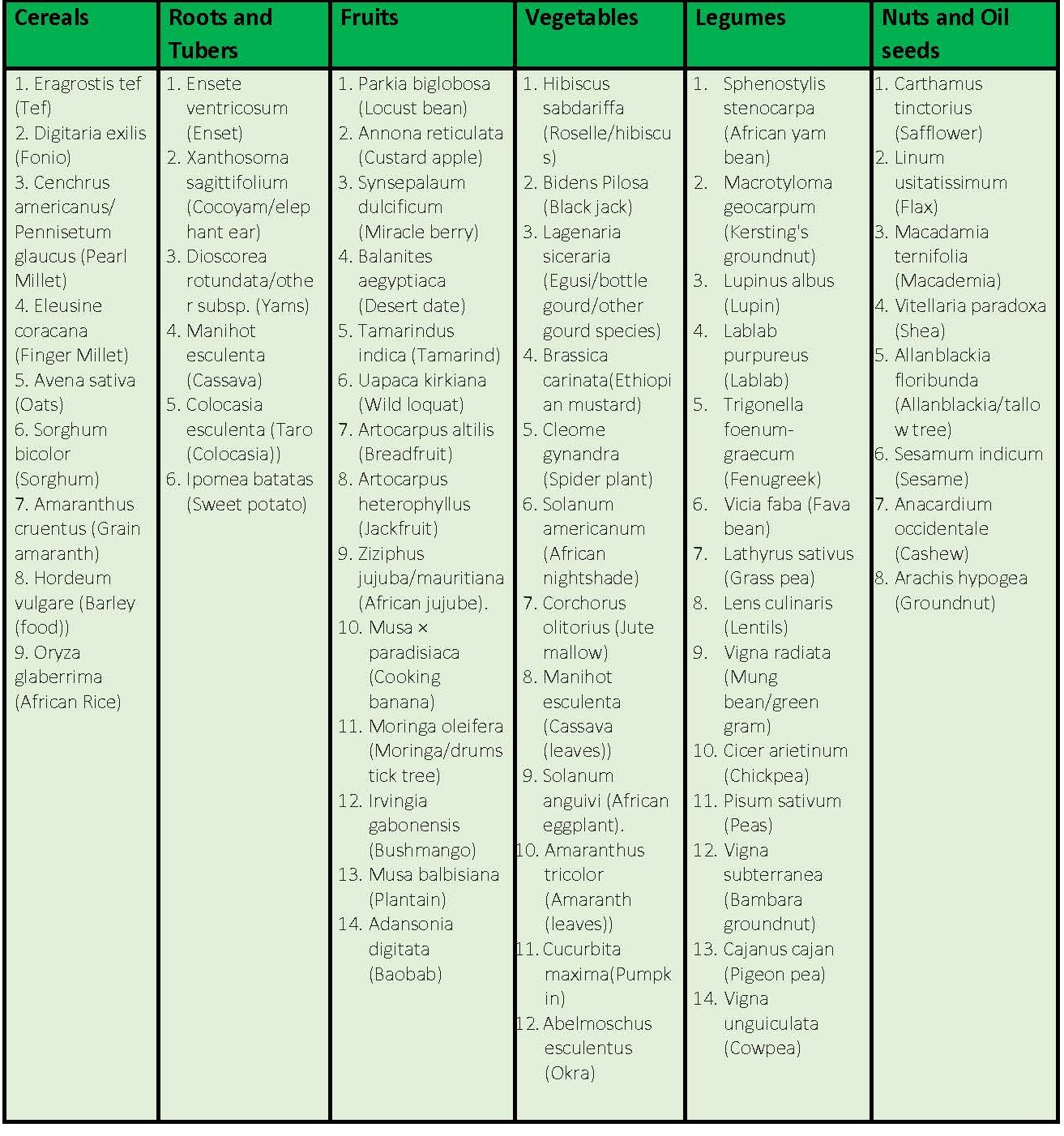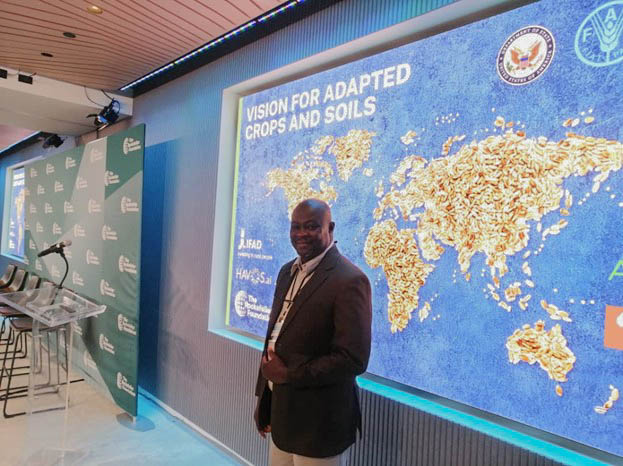By Prof. Wole Fatunbi
The Vision for Adapted Crops and Soil (VACS) is the latest wave in the development thought for Africa’s agriculture, food, and nutrition security. The brain behind VACS is Dr. Carry Fowler, the US special envoy for global food security. Since the beginning of his thoughts, he has aligned it with the thoughts and actions of the Africa Union Commission (AU) and the Food and Agricultural Organization of the United Nations (FAO). The VACS has also drawn inputs from several other organizations such as the Forum for Agricultural Research in Africa (FARA), the CGIAR, AGRA, the Rockefeller Foundation, universities in the US and Africa, and ancillary organizations.
The objectives of VACS are to foster sustainable and resilient food systems in Africa and other parts of the world. VACS seeks to boost agricultural productivity and nutrition by developing diverse, climate-resilient crop varieties and building healthy soils.
Fulfilling this vision will certainly require identifying indigenous or adapted food crop commodities with highly competitive nutrient content and the capacity to adapt to the known and projected vagaries of climate change as well as having the potential to contribute to the desired food systems transformation in Africa. In the Phase 1 Technical Workshop to operationalize VACS held in Rome in May 2023, the need for data and evidence for the selection of crops was highlighted as well as having robust evidence for consumption patterns for food made from the commodities. The first workshop commissioned a series of studies including smart modeling to inform the choice of commodities with the required potential.
FARA participated in the second convening of the VACS organized by the Rockefeller Foundation in its exquisite Global Headquarters at 420 Fifth Avenue on 38th Street New York. The Phase 2 workshop was held on the 28th and 29th of November 2023 and had more than 71 high-level researchers and thought leaders in agricultural subjects especially, plant breeding, modeling, climate change, agronomy, and policies. The presentation of outcomes of the studies and interaction pointed to the following commodities as potential crops for intervention Table 1. Apparently, these commodities are selected based on available data, but the modelers still complain about insufficiency of data.
Table 1. Prospective Commodities for VACS Intervention

The FARA one cent idea is not to equate humans to figures in data, apparently most great opportunity crops lack research and data in key global repository, as such they will not feature prominently. The selected commodities need to be subjected to more qualitative methods like the “Participatory Prospective analysis” often used in Foresight studies. The bottom line is to provide the Africa stakeholders, especially the non-research actors viz., farmers, youths, women, and private sector actors the opportunity to have a say in this vital selection of commodities that will affect their food and nutritional security. Doing this will be the truest way to give all the needed sense of ownership, co-creation, and co-delivery of the VACS vision. On another note, some of the commodities that comes prominent in the list have had a significant research investment and promoted widely; the likes of Sweet Potato etc, have shown their potentials and are already widely used. The investment on such commodities could target the development of new food products and publicity on their nutritional values. All the commodities also needs to be screened for ease of crop improvement through breeding and the possibility of having a good seed systems. The commodities that are propagated using vegetative methods are often tricky in this sense, for instance genetic improvement of the Banana and Plantain are limited due to the ploidy issues that makes cross pollination difficult and having a hybrid almost impossible except with the new technologies in plant breeding.

VACS Event Session at the Rockefeller Foundation Headquarters, USA

Prof. Lindiwe Majele Sibanda (CGIAR System Board Chair) addressing the VACS session at the Rockefeller Foundation Headquarters, USA
The VACS is a vision accompanied by action and should be domesticated on the continent and at the country level. The research efforts should engage actively with the African regional agricultural research coordination architecture and the National Agricultural Research System (NARS) for implementation. VACS needs to avoid the old error of solely delegating African agricultural research to the International agricultural research centers in the name of the erroneous lack of capacity of the NARS. The international center should complement the NARS and not the other way around. Mainstreaming the VACS implementation into the recently developed framework for cooperation between the Africa Agricultural Research and Innovation Institutions (ARII) and the one-CGIAR will be a great way to go.
It is believed that the starting point of VACS is the mainstreaming of the opportunity crops; this will embrace the development of breeding programs and seed systems. It will also include research and development efforts to create new food products to drive a commercial demand for the commodities and research outputs. The next in line should be a set of systematic actions on soil management; this should be built on the existing continental framework in Africa. The Soil Initiative for Africa (SIA) is the long-term framework, its 10-year implementation is structured into the Africa Fertilizer and Soil Health Action Plan (AFSH-AP). The core element should include halting land and soil degradation, promoting soil health, developing an Africa soil information system to drive the sustainable use of Africa soils as a vital production asset. These efforts will align together to ensure concurrent adaptation and mitigation of climate change.
In conclusion, VACS is the new wave and keeping it strong to deliver its intended outcome will relies on effective engagement, right investment and giving attention to the right and practical issues.

Prof. Wole Fatunbi (Ag. Director of Research, FARA) at the VACS Event organized by the Rockefeller Foundation






7 Comments
Congratulations sir, this is an inclusive encompassing initiative to drive food production and still maintain healthy soil. It also takes into consideration effective breeding program for seed improvement and conservation program.
I am very happy for you dear president of Fara, for such an opportunity that you allow the African countries of entry so that our agriculture can move forward, we welcome this approach to our African continent. As for us, we should put together strategies to make this approach effective. thank you very much for this very enriching article.
Excellent !
And in between, water management should also be strongly emphasized. Itnplays a key role in ensuring healthy plant varieties and healthy soils. These Initiatives, VACS and SIA are so important in ensuring sustainable food and nutrtition security in Africa.
Congratulations to FARA, Prof. Fatunbi, Dr. Fowler and partners for this wonderful and important initiative. There are many indigeneous, well-adapted crops with great potential and it is a very good first step to create a starting list to help focus efforts. Indeed data is needed on use of the crops, and how it varies by regions. We also need data on who and where they are produced and use that to get inputs from local farmer producers as to what are the main constraints facing their production, to help design the breeding programs. Likewise, what quality traits in the food products are essential to maintain in the breeding material as we breed for higher yields and disease resistance, as well as resilience to climate change. And get the farmers to provide inputs on where they source their planting material from, and what challenges need to be overcome. Besides informing the design of the breeding programs, it will help direct funding to research efforts on the genetics of desired traits and phenotyping assays required.
This is a step in the right direction that VACs is making. We cannot have resilient food systems without including the indeginous crop varieties.
Game changer on Africa landscape, food security & better nutrition.